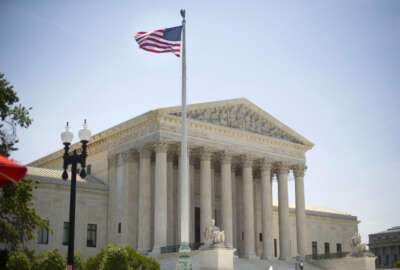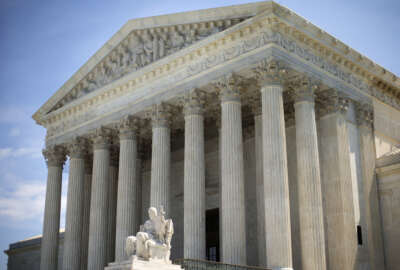
Little-noticed interim rule overshadows two Supreme Court procurement decisions
The RRB issued an interim rule to increase penalties under the False Claims Act for the first time in 20 years.
The “Rule of Two” is mandatory for the Veterans Affairs Department no matter how well they are doing in meeting their small business goals.
When vendors sign an invoice and send it to the government for payment, they are acknowledging they have met the requirements under the contract.
These were the major outcomes from two cases decided last week by the nation’s highest court.
While both these cases will have long-lasting impacts on the federal procurement community, a little-known rule by the Railroad Retirement Board (RRB) is what contractors really should be paying attention to over the summer.
The RRB issued an interim final rule May 2 to nearly double the cost per incident under the False Claims Act (FCA).
“Penalties under the False Claims Act pegged at the current rate of inflation for a long time and they are adjusted up or down, but they haven’t been for quite a while,” said Bill Wilmoth, a partner with the law firm Steptoe & Johnson and a former U.S. attorney for the Justice Department. “The Railroad Retirement Board was the first agency to make the upward adjustment and my opinion and others is it’s just a matter of time before every federal agency changes their regulations to up the penalties.”
Wilmoth, who blogged about the potential for FCA penalties in May, said the interim rule the RRB released in May would increase the amount per claim vendors could be held liable for to between $10,781 and $21,563, from $5,500 and $11,000.
The RRB interim rule is set to take effect Aug. 1.
Wilmoth said this would be the first increase in False Claims Act penalties since 1996.
“This is something you think about every once in a while, but I didn’t anticipate it until the RRB notice,” he said. “It was just a matter of time for the government to increase the penalties. For people who represent potential defendants, we already thought the penalties were too stiff so it will be even worse now.”
Wilmoth said it’s not a matter of if, but when other agencies, including the Justice Department, will follow the RRB and increase the FCA penalties.
“The increase in penalties means very few False Claims Act cases will be tried, which is already the case,” he said. “People will come to the U.S. attorney or agency who is prosecuting and try to make the best deal they can. You pretty much have to because if you go to trial and get clubbed with all these penalties it would bankrupt most companies. Each distinct case could include hundreds of claims for each violation. If you had a situation where you had one or two distinct claims then a company could afford to push the government to prove their case, but there are generally so many distinct claims in every FCA case and if you lose you lose so big. You almost have to make a deal and rely on the reasonableness of the government lawyers to not try to put the company out of business.”
The reasonableness of the government was at the heart of the Supreme Court case.
The case, Universal Health Services, Inc. v. Escobar revolves around Medicaid payments and whether a subsidiary of Universal Health Services submitted a false claim for allegedly not having properly credentialed medical professionals caring for a patient.
The justices ruled 8-0 on June 16 that vendors can be held liable for implied certifications when they submit a claim for payment from the government. The justices also found contractors also are liable for violating legal requirements even if they were not specifically called out in a contract.
“There was good news and bad news for contractors in this decision. On the positive side, the Supreme Court rejected the notion that every contractual violation in a government contract gives rise to False Claims Act liability,” said Eric Crusius, an attorney with Miles & Stockbridge. “On the negative side, contractors are now subject to False Claims Act violations under the implied certification theory around the country and not just in the Circuit Courts where it was previously recognized. Contractors should not be popping the champagne just yet, however, because the Court was clear that there are a wide range of circumstances where False Claims Act liability would attach. This makes having an effective compliance program with vigilance even more critical.”
Other attorneys say the Supreme Court ruling is a win for whistleblowers.
“The decision puts to rest the argument that a contract or statute must identify a requirement as a condition of payment in order for liability to exist. The ‘express condition of payment’ argument that government contractors use to avoid liability now is dead,” said Claire Sylvia and Colette Matzzie partners at the whistleblower law firm Phillips & Cohen in a statement. “Although defense lawyers will likely seize on one aspect of the decision — the court’s observation that the government’s payment of a claim when it knows that the healthcare provider or company hasn’t complied with certain conditions can be used as evidence that the noncompliance wasn’t relevant — government payment wouldn’t necessarily be grounds to dismiss a case. The reality is that the government often pays contractors for good reasons, such as a need to ensure that the military or a hospital has vital equipment, even in the face of noncompliance with important requirements. In addition, the government often pays without knowing that a claim for payment was false, which is why the False Claims Act and whistleblowers are so important.”
Roger Waldron, the president of the Coalition for Government Procurement, said there also is some good news in the court’s decision for vendors.
“Although the Supreme Court accepted the implied false certification theory, the court’s establishment of a ‘rigorous and demanding’ materiality test appears to be a more common sense approach to FCA liability that should mean that the FCA will not be used to punish day-to-day, ‘garden-variety’ breaches of contracts or violations of regulation,” he said.
The other big ruling that agencies and vendors should be paying close attention to is the Kingdomware case against the Veterans Affairs Department.
Kingdomware, a service-disabled, veteran-owned small business, challenged VA’s interpretation of a law requiring the agency to set-aside all procurements if at least two veteran-owned small businesses are qualified.
The nation’s highest court reversed the lower court’s decision on June 16 by an 8-0 vote, finding VA must use the “rule of two” for supply schedule contracts even if it has met its statutory contracting goals.
Related Stories
“This is the first time the ‘rule of two’ has been applied to Multiple Award Schedule contracts,” said Larry Allen, president of Allen Federal Business Partners. “Although the court essentially upheld a special veterans-preference law that applies only to VA buys, the precedent set today may inspire other small firms to take their own action to expand the rule of two to GSA Schedule contracts. The Government Accountability Office, for example, previously issued a ruling in the Delex case stating that the rule should apply to all non-schedule IDIQ contracts where there are two or more small business prime contractors. GSA and other agencies that manage IDIQ contracts promptly issued legal guidance intended to circumvent the GAO ruling, but that precedent, along with today’s Supreme Court decision, means that larger businesses need to pay close attention to any movement to automatically set-aside any IDIQ task order for small businesses where two or more such companies are primes on the vehicle being used.”
Allen and other federal procurement experts expect another challenge in the coming year against all schedule contracts for all small business and socioeconomic categories.
“The court also rejected the notion that FSS orders are somehow different from ‘contracts’ within the meaning of the Veterans Health Care, Benefits and Information Technology Act of 2006. As a result, the VA’s use of FSS contracts to skip past veteran-owned businesses will have to end,” said Steve Ramaley, an attorney with Miles & Stockbridge. “And, barring intervention from Congress, this holding will likely result in an increase to the number of service disabled veteran-owned small businesses set-asides at the VA, as well as total contract dollars flowing to SD/VOSBs. But, as always, with more money comes more protests, investigations and enforcement actions. SD/VOSBs and their teaming partners should play close to attention to affiliation and SD/VOSB eligibility rules so that they stay out of trouble.”
Waldron offered another perspective. He said VA will face a new set of challenges to implement the court’s decision.
“The coalition looks forward to working with the VA as it reviews and adjusts its procurement planning processes to address the decision,” he said.
The National Veterans Small Business Coalition said it was pleased by the court’s decision.
“We now hope that VA will abide by the spirit and intent of Vets First,” said Scott Denniston, executive director of the NVSBC.
Read more of the Reporter’s Notebook.
Copyright © 2025 Federal News Network. All rights reserved. This website is not intended for users located within the European Economic Area.
Jason Miller is executive editor of Federal News Network and directs news coverage on the people, policy and programs of the federal government.
Follow @jmillerWFED




